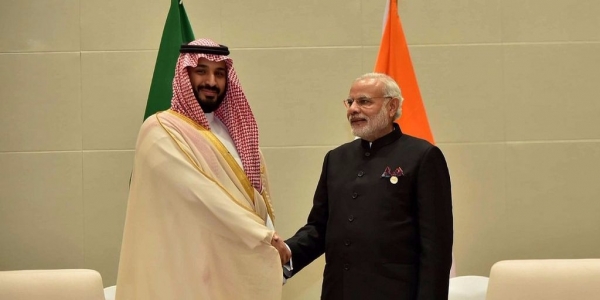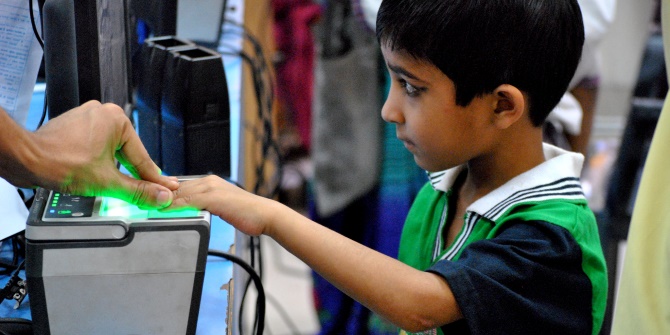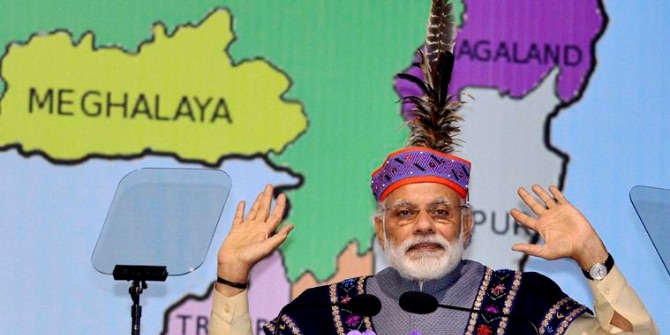 As the new Saudi Crown Prince gains more control, Pieter-Jan Dockx writes that India has a new balancing act to play between the House of Saud and the Islamic Republic. While counter-terrorism cooperation may increase, other indicators foretell a gloomy future.
As the new Saudi Crown Prince gains more control, Pieter-Jan Dockx writes that India has a new balancing act to play between the House of Saud and the Islamic Republic. While counter-terrorism cooperation may increase, other indicators foretell a gloomy future.
In June 2017, King Salman bin Abdulaziz ousted, heir to the throne, Crown Prince Mohammed bin Nayef, replacing him with his son, Mohammed bin Salman (MbS). The rise of the new Crown Prince, who de facto rules Saudi Arabia, has sent shock waves through the region. MbS, also the Minister of Defence, became notorious for his intervention in Yemen, causing a catastrophic humanitarian crisis. Recent manoeuvres by the ruler have further raised questions about the implications of MbS’ bold moves.
As he lifted the driving ban for women, the new Saudi ruler announced that the country would eradicate extremist thought and return to moderate Islam. This shift can be either interpreted as a means to attract foreign investors in line with Riyadh’s vision 2030 or as an instrument to subjugate the religious establishment. Here, it is important to note that it could positively impact the counter-terrorism component of the relationship between Saudi Arabia and India. Since 2006, both countries have signed numerous MoU on security matters, resulting in the extradition of multiple terrorists to India. Although increased counter-terrorism cooperation already seemed possible with the ousted Crown Prince Mohammed bin Nayef, who was dubbed “the prince of counter-terrorism” , his replacement’s proposed shift to a more open brand of Islam can also prove to be pivotal. The spread of Saudi Arabia’s ultraconservative Wahhabism has formed the ideological basis for terrorist groups across the globe, including in South Asia. Preliminary evidence such as the detainment of hard-line clerics and the establishment of an advocacy centre that aims to promote the welcoming version of Islam globally, predicts a possible end of the ideology’s diffusion. As India suffers at the hands of groups like the Lashkar-e-Taiba and worries about its own radicalising Muslim youth, the Prince’s goal of moderation will be well-received in New Delhi. Furthermore, online content that intends to radicalise the Indian youth often originates in Saudi Arabia. The policy change could facilitate more counter-terrorism cooperation in tackling online extremism.
Apart from domestic changes, MbS has also initiated a more assertive foreign policy. The aforementioned disastrous intervention in Yemen, the blockade of Qatar and the, widely assumed forced resignation of Lebanon’s Prime Minister Saad al-Hariri, are but a few examples of a grand design intended to curb Iranian influence in the Arab world. Although India and Iran were not on the same page in the wake of the Islamic revolution, both countries have traditionally enjoyed close ties. Furthermore, New Delhi’s quest for energy security and access to Afghanistan and Central Asia make Tehran a vital part of its foreign policy. The intensifying animosity between Riyadh and Tehran could jeopardise India’s delicate balancing act in the region and force the country to align with either side.
The sustainability of India’s non-alignment stance is also contingent on regional and global dynamics. In what is seemingly the only Obama policy he has not attempted to reverse, American President Donald Trump has commenced on a charm offensive to woo India into the Western alliance, a move reciprocated by Indian Prime Minister Narendra Modi. The Trump administration’s hawkish stance towards Iran and the President’s childlike praise for MbS’ domestic power grab, are indicative of how joining the American alliance could impact India’s think West policy. Moreover, sympathetic to the Palestinian’s struggle with colonialism, New Delhi has historically been cautious in its dealings with Israel. However, this long-held tradition was brought to a screeching halt in PM Modi’s recent visit to Tel Aviv. Considering Hindu nationalism’s inherent glorification of the Zionist struggle, the Indian Prime Minister refrained from visiting the Palestinian’s West Bank during his trip, a practice that has historically allowed New Delhi to balance its bond with both nations.

Supported by the US and with Iran as a common enemy, there has been a silent rapprochement between Riyadh and Jerusalem, which allegedly culminated in MbS going a secret visit to Israel. As India is cosying up to the three allies, it is only a matter of time before New Delhi finds itself entangled in the West-Asian cold war.
New Delhi’s relations with Riyadh are above all driven by energy security concerns. India is one of the world’s largest consumer and importer of oil. While in 2017, Iraq has slightly overtaken Saudi Arabia as India’s largest supplier, the kingdom has been India’s leading source of oil for over a decade. This dependency on the Sunni powerhouse gives New Delhi a vital interest in the country’s stability in order to safeguard its oil imports. Although the country is widely regarded as the region’s beacon of stability, analysts have repeatedly warned this to be a mere mirage. MbS’ recent Game of Thrones-like tour de force against potential rivals disguised as an anti-corruption probe, and his alleged use of Blackwater mercenaries, as his enforcers, reveal the fragility of the kingdom. Furthermore, domestic instability and possibly in the wider oil-rich region as a repercussion of bin Salman’s aggressive foreign policy, also raises the price of oil which adversely affects the Indian economy. The Crown Prince’s early November purge sent Brent crude oil futures to a two-year high.
The emergence of the new Saudi strongman and his radical overhaul of the kingdom’s domestic and foreign policy, could severely impact New Delhi. While the Crown Prince’s rejection of the country’s Wahhabi foundation, could lead to increased counter-terrorism cooperation, other indicators foretell a gloomy future. India’s warming ties with the warmongering protagonists of the anti-Iran alliance will endanger its balancing strategy between the House of Saud and the Islamic Republic. Finally, bin Salman’s adventurism is bound to lead to internal and regional instability which will have detrimental ramifications for the Indian economy.
This article gives the views of the author, and not the position of the South Asia @ LSE blog, nor of the London School of Economics. Please read our comments policy before posting.
About the Author
 Pieter-Jan Dockx graduated from LSE with an MSc in Conflict Studies. His main research areas include Middle East and South Asian politics. Read more of his blogs at www.pieterjandockx.com.
Pieter-Jan Dockx graduated from LSE with an MSc in Conflict Studies. His main research areas include Middle East and South Asian politics. Read more of his blogs at www.pieterjandockx.com.







